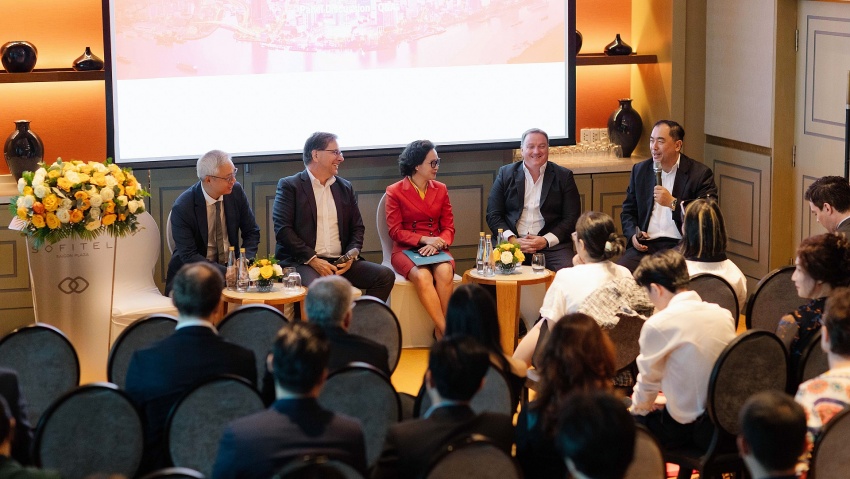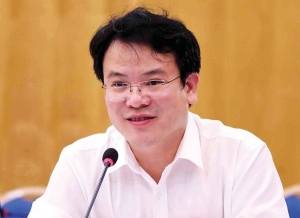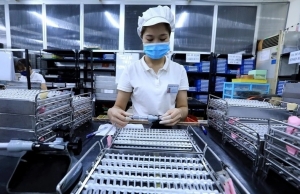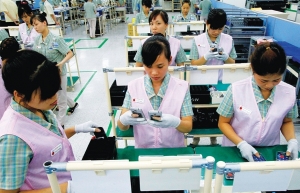FDI remains high despite global change
 |
| Experts discussed Vietnam's FDI growth |
At the conference "Vietnam's economic outlook: half year review and future prospects" organised by the Canadian Chamber of Commerce in Vietnam and InCorp on September 4 in Ho Chi Minh City, Michael Kokalari, chief economist of VinaCapital, said Vietnam was gradually improving its position on the global value chain.
“This development path is similar to the East Asian development model pursued by countries such as Japan and South Korea. This is a strategy that has proven effective,” Kokalari said.
In addition, he emphasised three key factors that are driving Vietnam's economy to grow rapidly, including rapid industrialisation thanks to FDI inflows, the increase in the middle-class, and special geopolitical strengths.
“Vietnam has been very successful in building good relationships with both the United States and China. In the region today, only Vietnam and Singapore can balance the position between the two great powers. This is the premise for strategic opportunities for industrialisation and economic growth," he added.
Jack Nguyen, CEO of InCorp Vietnam said that FDI flow mainly focused on manufacturing industries, real estate and energy, with Singapore, Japan and Hong Kong still the largest investors.
“Vietnam is becoming an attractive destination for Chinese businesses that want to diversify their supply chains. We receive consulting requests from Chinese companies, especially for the Northern market. Many Chinese manufacturers are moving to Vietnam to establish supply chains. The trend to build large-scale industrial parks on the outskirts of the city promises to create a new wave of investment," Nguyen said.
In addition, he emphasised that compared to other ASEAN countries, Vietnam ranks third in FDI flows in the first half, behind Indonesia and Singapore and ahead of Thailand and Malaysia.
“Vietnam's young working-age population of 67.5 million people is a significant advantage to attracting investment. Many employees are working in small and medium-sized companies, and companies prioritise employee retention, improving productivity and managing human resources costs," Nguyen said.
In terms of the real estate industry, Neil MacGregor, managing director of Savills Vietnam, said that infrastructure was an important factor as it was an area of government focus.
“We note that a number of new residential real estate projects have been launched recently, mainly in non-central business development areas where there is rapid economic growth thanks to manufacturing activities. FDI is an essential factor for the real estate market in all fields, especially industry," MacGregor said.
Savills data shows that Vietnam currently has more than 33,000 hectares of industrial parks for rent, with high demand and an occupancy of more than 80 per cent, especially in the southern region.
The emerging development trend is warehouses and ready-built factories, attracting significant attention from investors.
The average rental price also reached $5.4 per square metre per month and is mainly concentrated in the southern market. However, the north, especially provinces surrounding Hanoi such as Bac Giang and Hai Duong, is growing fast.
In addition, the retail market is driven by favourable demographics, including a strong increase in the middle class. A number of large-scale shopping centre projects in suburban areas have opened and attracted numerous consumers.
“Although domestic spending will slow somewhat in 2024, the overall rental retail real estate market is still performing well given the limited supply of space. This is also a challenge for retailers who need to expand their scale, likely pushing up rental prices in central areas," MacGregor said.
In addition, a recently published Savills Impacts study also indicated that Ho Chi Minh City and Hanoi were among the cities with the fastest growth rates globally thanks to factors such as demographics, urbanisation, and a growing middle class. Remittances to Ho Chi Minh City alone have reached a 10-year record high, with an estimated 20 per cent invested in real estate, supporting the recovery of the housing market.
As of the end of August, the total newly registered capital, adjusted capital and capital contributions and share purchases of foreign investors stood at over $20.52 billion, an on-year rise of 7 per cent, according to the Ministry of Planning and Investment.
 | Vietnam continues to see growth in FDI Deputy Minister of Planning and Investment Tran Quoc Phuong stated that numerous international financial organisations remain optimistic about Vietnam’s ability to attract foreign direct investment (FDI) in the second half of the year. |
 | Discerning selection helps Vietnam attract high quality FDI projects: minister Vietnam’s foreign direct investment (FDI) attraction continues to prosper in July, and quality of FDI capital flows increase sharply thanks to careful project selection, Minister of Planning and Investment Nguyen Chi Dung said at a recent regular Government meeting last month. |
 | FDI attraction to Vietnam: the myths versus the reality Over the past decade, Vietnam has seen a steady increase in foreign direct investment, which has significantly contributed to its economic development. Rizwan Khan, partner at Acclime Vietnam, looks at the reality of such investment moving forward in Vietnam. |
What the stars mean:
★ Poor ★ ★ Promising ★★★ Good ★★★★ Very good ★★★★★ Exceptional
 Tag:
Tag:
Related Contents
Latest News
More News
- Agentic AI set to reshape Vietnam’s enterprise landscape (February 10, 2026 | 12:06)
- Agro-forestry and fisheries exports jump nearly 30 per cent in January (February 09, 2026 | 17:45)
- Canada trade minister to visit Vietnam and Singapore (February 09, 2026 | 17:37)
- New tax incentives to benefit startups and SMEs (February 09, 2026 | 17:27)
- Vietnam forest protection initiative launched (February 07, 2026 | 09:00)
- China buys $1.5bn of Vietnam farm produce in early 2026 (February 06, 2026 | 20:00)
- Vietnam-South Africa strategic partnership boosts business links (February 06, 2026 | 13:28)
- Mondelez Kinh Do renews the spirit of togetherness (February 06, 2026 | 09:35)
- Seafood exports rise in January (February 05, 2026 | 17:31)
- Accelerating digitalisation of air traffic services in Vietnam (February 05, 2026 | 17:30)





















 Mobile Version
Mobile Version